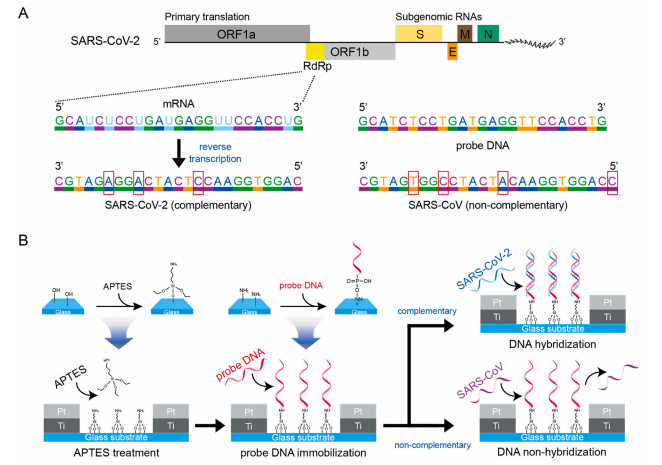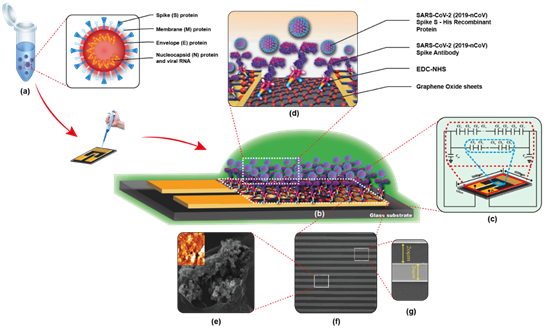Prof. Kim Namyoung Developed a Technology Capable of Diagnosing COVID-19 Through Biosensors
- admin
- 2022-02-22
- 1086
Professor Kim Namyoung (Department of Electronic Engineering), Developed a Technology Capable of Diagnosing COVID-19 Through Biosensors
Prof. Kim Namyoung (Department of Electronic Engineering) research team developed two new technologies that can accurately diagnose corona virus at the level of PCR (polymerase chain reaction) test within 3 seconds using a biosensor.
The new technology of the first method is a DNA biosensor jointly developed with Professor Kim Joohee of Ajou University College of Pharmacy, Professor Park Seongjoon of the Department of Electrical Engineering at Ajou University, and Researcher Kim Eunseong of Kwangwoon University. It is a gene detection method using a specific nucleotide sequence of the corona virus, which is the principle of PCR test, and uses ‘probe DNA’ that binds to the DNA of the corona virus. Its greatest feature is the sensitivity that can analyze up to 50 nM (nanometers) of DNA without electron amplification. Therefore, the reliability and accuracy are high enough to analyze the DNA concentration at the level of incubating patients and asymptomatic patients.
Related research papers are published in the top international journal in the field of sensor analysis chemistry, 'Ultra-fast and recyclable DNA biosensor for point-of-care detection of SARS-CoV-2 (COVID-19), Biosensors and Bioelectronics, Q1 , IF: 10.257, Biosensor field 1%). Nine Pharm has licensed ‘recyclable and rapid DNA biosensor technology for on-site diagnosis of SARS-Cov-2’ and is pursuing research for future commercialization.

Development of a chip using ‘probe DNA’ that binds to the DNA of the coronavirus
The second type of new technology is a new technology developed exclusively by Professor Kim Namyoung and his research team at Kwangwoon University. GrO-free double interdigestion capacity for selective and rapid detection of the Severe Acute Respiratory Syndrome Coronavirus (SARS-CoV-2) Spike (S1) protein (DIDC) is a technology using a GrO/EDC-NHS/anti-SARS-CoV-2 antibody (Abs) layer-by-layer interface self-assembly chemistry method on a biosensing platform.
The results of the study confirm that GrO provided a desirable engineered surface for Abs immobilization, with a wide detection range (1.0 mg/ml - 1.0 fg/ml), a reaction time lower than 3 seconds (1 fg/ml) ), good linearity (18.56 nF/g) and high sensitivity of 1.0 fg/ml were achieved.
The currently developed biosensor chip enables the fastest real-time measurement and achieves the highest sensitivity. If the actual commercialization is promoted based on the laboratory's measurement results, it is expected that the coronavirus test will be possible in seconds instead of the PCR test that takes 4 to 6 hours.

GrO/EDC-NHS/anti-SARS-CoV-2 Antibody (Abs) Layer-by-Layer Interface Self-Assembly Chemistry Method
Related research papers are published in ACS Sensors (Ultrasensitive and Reusable Graphene Oxide-Modi®ed Double- Interdigitated Capacitive (DIDC) Sensing Chip for Detecting SARS- CoV®2, ACS Sensors, Q1, IF: 7.33 Field 3, a top international journal in the center field. %) was published. Through continuous research in the future, joint research with pharmaceutical companies is being sought.